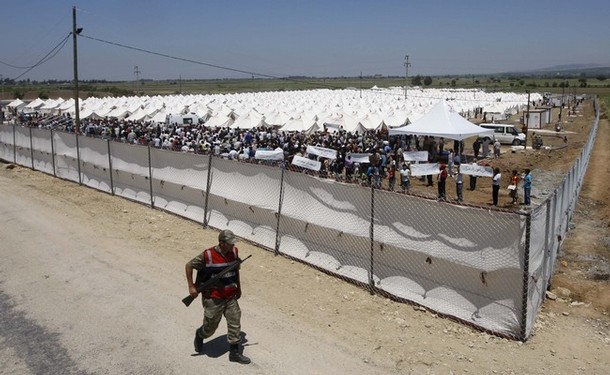
Almost 10,000 Syrian refugees have entered Turkey over the last several days, as the Syrian government escalates its crackdown on protesters. While this is a large number, the Turkish daily Posta suggests Ankara fears much worse—that a civil war in Syria could flood Turkey with 200,000 more refugees.
During a recent summit in Ankara, Turkish officials proposed a solution to head off this scenario: create a buffer inside Syria, along its frontier with Turkey. “We would close the border, but we cannot turn our backs on either the Sunnis or the Alawites,” one Turkish official explained, “If chaos starts, then we have to form a security or a buffer zone inside the Syrian territory.”
This idea has precedent and a positive one at that.
In 1991 half a million Iraqi Kurds tried to flee to Turkey, fearing Saddam Hussein’s reprisals as he sought to reconsolidate control following his defeat in Kuwait and subsequent Kurdish and Shi‘ite uprisings. Fearing a refugee crisis, Turkish president Turgut Özal refused to allow them to enter the country, and instead proposed the creation of a Kurdish safe haven. Two UN Security Council resolutions led to what became known as Operation Provide Comfort, a humanitarian rescue mission and no-fly zone led by the United States. The resulting safe haven enabled Kurds to establish an autonomous region within northern Iraq which, even under UN sanctions, was remarkably successful. It also allowed numerous political parties to compete in a relatively democratic regional election in 1992. Today, Iraqi Kurdistan has its problems, but most observers consider it to be the most prosperous and secure region in that country. Simply put, the buffer gave it a head start over the rest of Iraq.
The safe haven enabled Kurds to establish an autonomous region within northern Iraq which, even under UN sanctions, was remarkably successful. It also allowed numerous political parties to compete in a relatively democratic regional election in 1992. Today, Iraqi Kurdistan has its problems, but most observers consider it to be the most prosperous and secure region in that country. Simply put, the Turkish buffer, which the United States, Britain, and France protected with the no-fly zone, gave it a head start over the rest of Iraq.
Three years ago, I traveled throughout Syria, including to some of the towns and cities which are now war zones. The following winter, I visited Iraqi Kurdistan. Syria was stagnant and dilapidated, without any sign of true civil society. By contrast, Iraqi Kurdistan was vibrant, with university students and women lobbying for their causes, and civic associations es sprouting seemingly in every town and village.
It is ironic that when election posters go up in Syria, they are for Iraqi candidates competing for the votes of several hundred thousand Iraqi refugees who now live in Syria. Syrians, however, could not participate in these elections: For almost the last half century, the Syrian political system has not tolerated real contested elections. . In a safe haven, however, displaced Syrians might develop civil society and support organizations, some of which might evolve into political parties. The Turkish buffer could give Syrians room to breathe and develop.
In United States, Europe, Israel, and the Arab world, officials are hesitant to force Bashar al-Assad’s fall for fear of what might come next. A safe haven along the Turkish-Syrian frontier, however, might not only save lives but, in a best case scenario, might become a core from which a new, more prosperous Syrian entity might emerge. The displaced Syrians might establish schools with a new, more modern curriculum. Syrians might debate their future openly without fear of retaliation or censorship. They might organize their lives without interference from the government. In the end, so much—whether good or bad—also depends on how clearly Turkey articulates its plans, and how long the security zone will last. If Turkey creates a safe haven only to pull the carpet out from its Syrian residents several weeks later, it may do more harm than good and simply delay a humanitarian tragedy.
Anna Borshchevskaya is an assistant director with the Atlantic Council’s Dinu Patriciu Eurasia Center. Photo credit: Reuters Pictures.
Image: turkishborder.jpg
